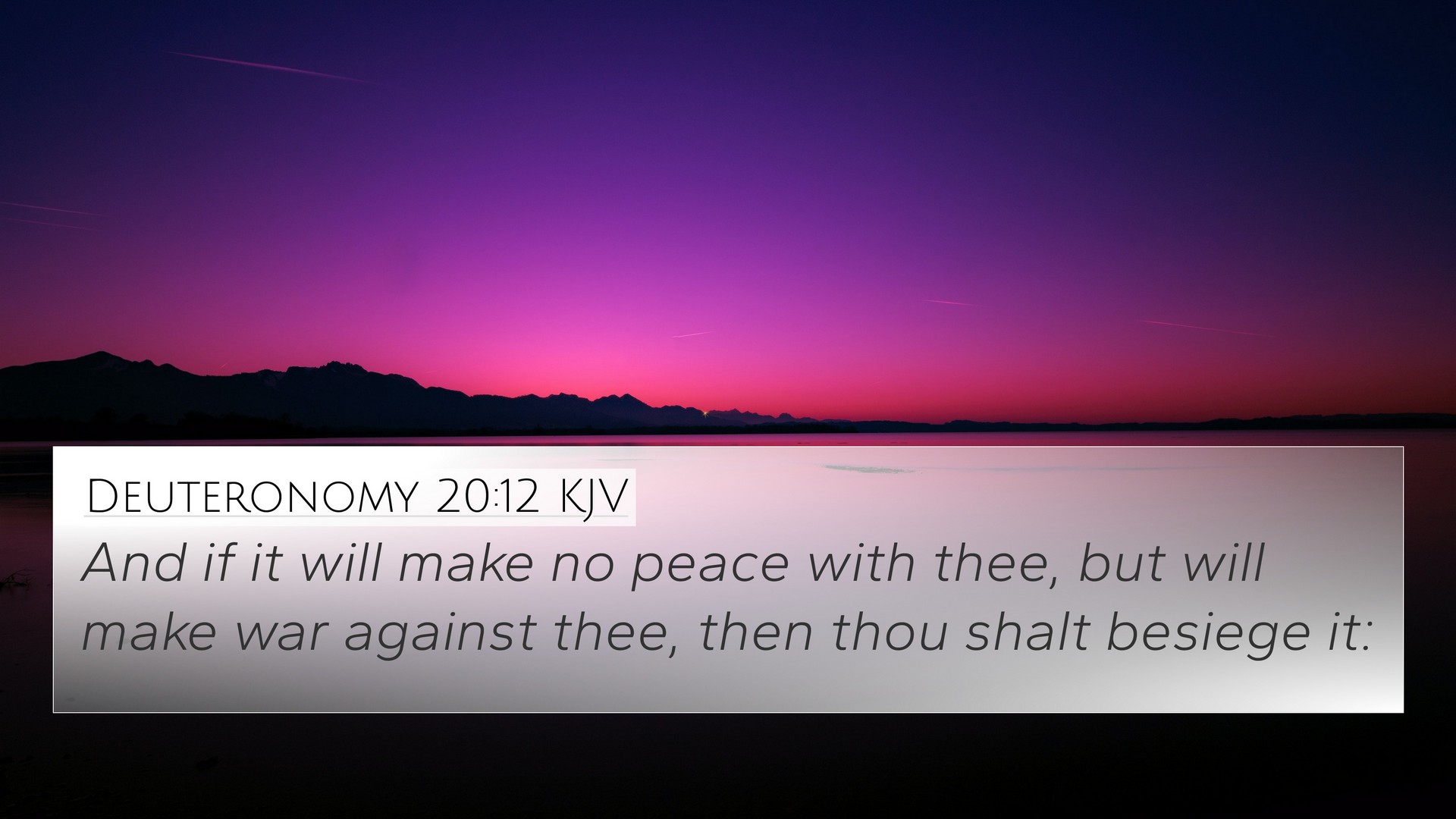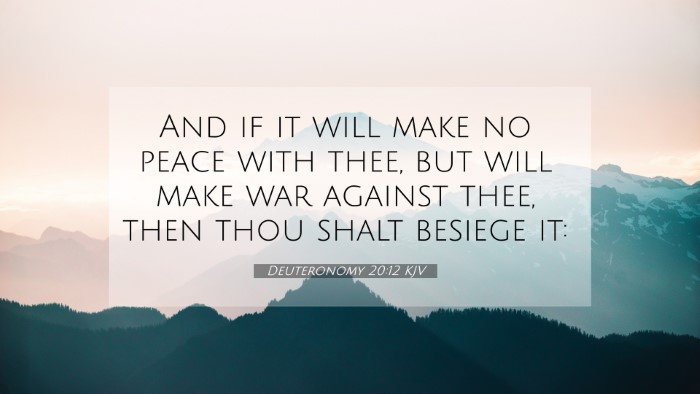Understanding Deuteronomy 20:12
Verse: "But if it make no peace with you, but will make war against you, then you shall besiege it." (Deuteronomy 20:12, ESV)
The verse in Deuteronomy 20:12 addresses the protocols for engaging in warfare with cities that offer terms of peace. It reflects the seriousness of conflict and the measures taken when peaceful negotiations fail. The following analysis draws insights from public domain commentaries to provide a comprehensive understanding of this verse.
Contextual Background
Deuteronomy 20 offers guidelines on warfare for the Israelites as they prepare to enter the Promised Land. The law emphasizes the importance of offering peace before engaging in conflict, showcasing God’s desire for reconciliation and order.
Commentaries Insights
-
Matthew Henry:
Henry emphasizes that this law teaches the Israelites to first offer peace and only resort to war if those terms are rejected. The underlying message is one of mercy, where God allows for the possibility of peace, altering the cycle of violence.
-
Albert Barnes:
Barnes expounds that the idea of besieging a city indicates a methodical approach to warfare, underscoring the intentionality behind each action. The commentary suggests that God equips His people not only to engage in battle but also to seek resolution through peaceful means.
-
Adam Clarke:
In Clarke’s interpretation, the directive is a testament to the seriousness of war; it must not be entered into lightly. Should peace be refused, besieging is a last resort, advocating for careful consideration before escalating to violence.
Theological Implications
The verse reveals significant theological implications about God’s character. It shows that while God may permit war, His preference lies in peace and reconciliation. The structure of this law underscores the concept of justice as it aligns with divine will.
Bible Verse Cross-References
This verse can be cross-referenced with several other scriptures that share thematic elements:
- Judges 20:12-14 - Where the Israelites gather to consult God before making war.
- 1 Samuel 11:1-2 - Saul’s offer for peace and the response of the Ammonites reveals the dynamics of conflict.
- Matthew 10:34-36 - Jesus speaks about the divisive nature of His mission, reflecting on the choices of acceptance and rejection.
- Romans 12:18 - "If possible, so far as it depends on you, be at peace with all men," reflecting on the importance of peace in relationships.
- James 4:1-2 - Discusses the source of conflicts and quarrels among people, highlighting the need for internal peace.
- Proverbs 20:18 - Advises reaching agreement before action, aligning with the principle of seeking peace first.
- Deuteronomy 21:10-14 - Similar laws concerning warfare and treatment of captives emphasize mercy and righteousness.
- Matthew 5:9 - “Blessed are the peacemakers,” which echoes the importance of pursuing peace.
- Jeremiah 29:7 - Urges the exiles to seek the prosperity of the city and pray for it, promoting peace as a community effort.
- Psalm 34:14 - Encourages seeking peace and pursuing it, reinforcing the biblical theme of valuing peace.
Connections between Bible Verses
The connections between these verses illustrate a biblical framework where believers are encouraged to seek peaceful resolutions to conflicts, emphasizing mercy as foundational to God’s law. By exploring thematic Bible verse connections, we see a more profound dialogue across the Scriptures.
Researching Inter-Biblical Dialogue
To engage in a well-rounded comparative Bible verse analysis, one may utilize various tools such as a Bible concordance or a Bible reference resource to identify further connections between Old and New Testament teachings. These tools can aid in uncovering nuances in the themes presented in Deuteronomy 20:12 and related scriptures.
Applying Cross-Referencing Bible Study Methods
Applying methods of cross-referencing when studying the Bible helps illuminate meanings and themes. For those interested in how to use Bible cross-references effectively, consider exploring connections that support or contrast with the principles found in Deuteronomy 20.
Conclusion
In summary, Deuteronomy 20:12 provides a profound insight into God’s character concerning warfare and peace. The calls for peace before conflict establish essential principles that resonate throughout the Scriptures. By engaging in a comprehensive Bible cross-reference study, believers can deepen their understanding and application of biblical teachings in their lives.


